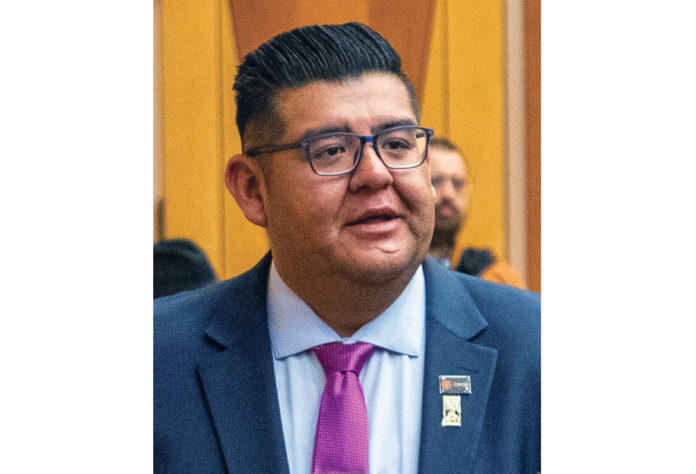Over 600 tribal leaders, regulators, industry professionals and policy experts gathered at the 27th annual Western Indian Gaming Conference (WIGC) at the Pechanga Resort Casino in Southern California held February 20-22 for a series of speeches, seminars, and tradeshow.
James Siva, Chairman of the California Nations Indian Gaming Association (CNIGA), delivered the annual State of the Tribal Nations address and focused on several issues confronting tribes and tribal government gaming in California. He called for unity among tribes in the face of a variety of issues affecting them.
“The solutions are ultimately within our reach; yet we can only do these things if we are unified, not in every detail, but rather united in purpose,” said Siva. “Now is the time to put our collective minds together and chart a path that benefits all tribes. It’s all there for us if we want it, but the only way we will get the future we envision is if we work together.”
Chairman Siva touted CNIGA’s growth to 52 tribal members, which represents the vast majority of gaming tribes in California. The address touched on a variety of topics, including tribal economic progress, and previewed topline numbers in an upcoming economic impact study from Beacon Economics. California tribal government gaming generated approximately $17.2 billion in economic output, supporting more than 85,200 jobs overall statewide.
Mark Macarro, Chairman of the Pechanga Band of Indians and President of the National Congress of American Indians, provided the invocation for the conference. He recounted his tribe’s journey to gaming and how the tribe protected cultural resources at nearby Pu’eska Mountain, a sacred site for the tribe. “We simply wouldn’t have been able to protect this site without the revenue from gaming,” said Macarro.
A general session panel was held on SB 549, state legislation in California that seeks to authorize a limited declaratory and injunctive relief action before the Superior Court of California, County of Sacramento, to determine whether certain controlled games operated by California commercial card clubs are banking card games that violate California law and infringe upon tribal exclusive gaming rights. Tribes have long contended that commercial cardrooms have been offering house-banked games in defiance of the California Constitution, which gives tribes exclusive rights to such games. The legislation had stalled out at the end of last year’s legislative session and was revived this year. Panel members discussed the need for the legislation and reported on its current status.
In addition to the general session, panels that followed during the conference focused on a wide range of topics and featured experts in tribal government; casino operations and security; regulation; finance and business development; and law. Of the last subject area, the seminars, pending state bar approval, count toward yearly minimum continuing legal education requirements for attorneys in California as they have in previous years.
One of the hotly anticipated panels this year was on sports wagering, moderated by CNIGA Chairman James Siva and featuring Christian Genetski, President of FanDuel. Siva acknowledged that CNIGA and a large number of tribes opposed and worked to defeat FanDuel-backed Proposition 27 in 2022 by one of the biggest margins in state history. Tribes felt that corporate operators such as FanDuel tried to make tribes junior partners in the sports wagering market with Proposition 27. For his part, Genetski acknowledged that mistakes had been made on Proposition 27, and that “we didn’t appreciate the time and work required to go into this,” promising they would work more collaboratively with tribes. However, during a subsequent discussion, multiple attendees said that actions would be required to back up the words.
Other panel topics included a second general session panel on secretarial procedures for compacts deemed negotiated in bad faith by state governments that featured Paula Hart, Director of the Indian Affairs Office of Indian Gaming in the U.S. Department of the Interior. Breakout sessions included subject areas such as clean energy funding, updates on litigation with the state regarding overreach in the compacting process, and cyber security.
The WIGC also honors both tribal and industry leaders with an awards luncheon held every year at the conference. The awards include the Anna Sandoval Leadership Award and Pauline Murillo Industry Leader Award, named for noted California tribal figures well-known for their work in asserting tribal sovereign rights and improving the lives of their respective tribes. This year’s recipient of the Anna Sandoval Leadership Award was the late Beverly Hunter, who served as Chairwoman of Table Mountain Rancheria and was a regional and statewide leader in tribal organizations. She was honored for her longtime service ensuring tribal sovereign rights in California. Taking the honors for this year’s Pauline Murillo Industry Leader Award was Russell Witt, who has served Indian Country in several Associate Membership roles, including two terms as the Associate Member Representative for CNIGA where he doubled the Associate Membership for the association.
For more information about California Nations Indian Gaming Association, visit www.cniga.com.














































